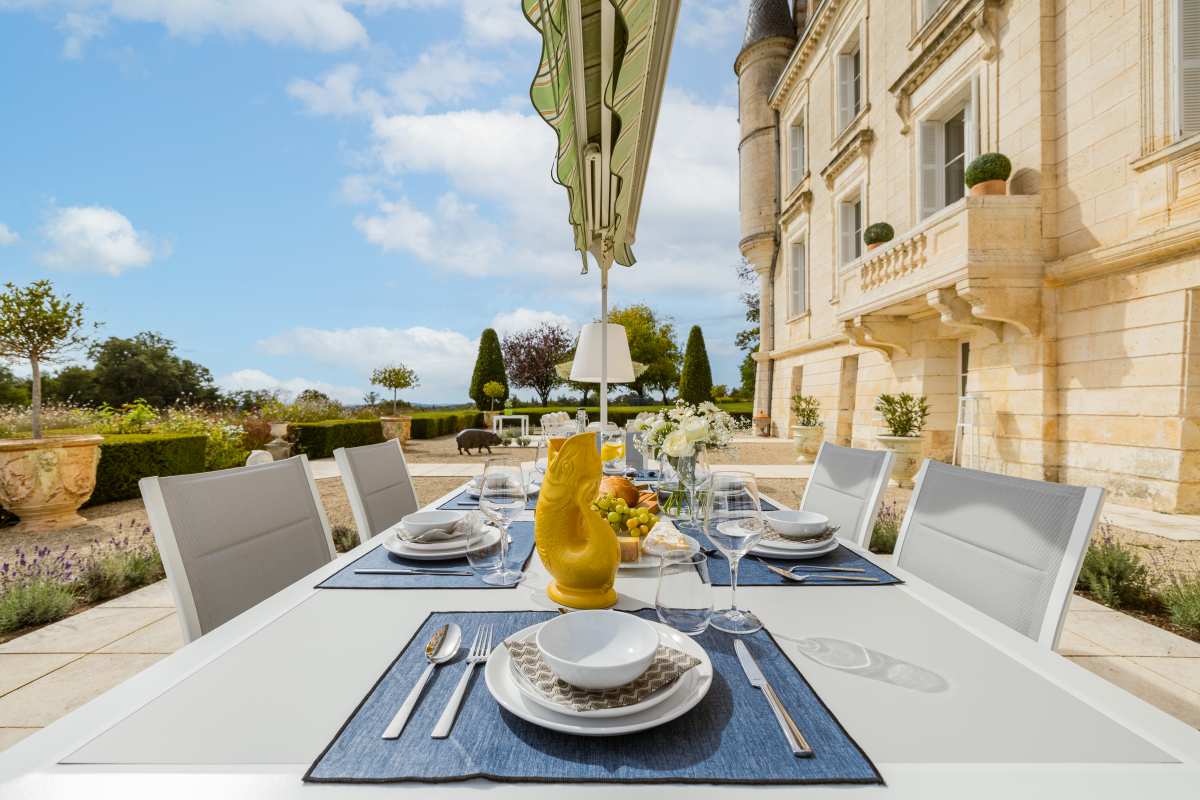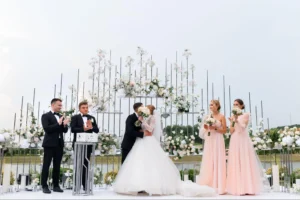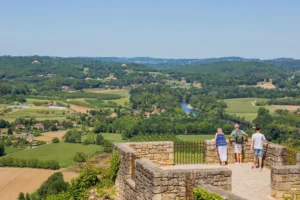The idea of renting a castle in France is exciting—until you try to figure out how much it costs. Some places charge a few thousand euros, while others can go well over €50,000. And the difference isn’t always clear. How Much Does It Cost to Rent a Castle? What’s included? What’s extra? Why are two similar-looking châteaux priced so differently?
That confusion is where most people get stuck. Renting a castle isn’t like booking a hotel. Prices change based on the season, how many people you’re hosting, what kind of event it is, and even how long you plan to stay. On top of that, many rentals come with hidden fees or unclear terms that make it hard to know what you’re paying for.
If you’re planning a wedding, group holiday, or retreat, this guide will help you understand what drives the cost. You’ll learn what affects pricing, how to avoid surprises, and how to choose a château that gives you real value, not regrets.
Why Rent a Castle in France?
Cozy bedroom with a large bed and natural light from windows at Château de Lasfonds.
When you hear “renting a castle in France,” it’s easy to imagine grand stone fortresses straight out of a fairy tale. But the reality covers a broad range of properties, each with unique features and price points.
French castles, often called châteaux, range from medieval strongholds with thick stone walls and defensive towers to elegant Renaissance estates boasting manicured gardens and luxurious interiors. Some are centuries old and have rich histories, while others are restored properties blending old-world charm with modern comfort.
Value for Money on a Per-Guest Basis
While the upfront cost can seem high, renting a castle can be surprisingly economical considering the size and amenities. For groups of 10-20 or more, the per-person cost often beats luxury hotel stays, especially when considering self-catering options and included amenities.
Unmatched Concentration of Historic Castles
France boasts thousands of castles, from medieval fortresses to Renaissance châteaux. This sheer variety means more choices at different price points and styles. Unlike in other countries, you’re not limited to a handful of properties.
Proven Rental Infrastructure
France has a mature market for château rentals, with agencies and platforms specializing in these unique properties. This means more transparent pricing, professional management, and better support, which are critical to avoid the pitfalls of dealing with private owners who might not have rental experience.
Rich Cultural Experience
Staying in a French castle offers more than grand walls. It connects you with centuries of history, local traditions, and regional specialties—whether you’re wine tasting in Bordeaux or exploring the Renaissance art of the Loire Valley. Standard luxury hotels or rentals can’t match this cultural depth.
Ideal for Large Groups and Events
Many castles are designed to host weddings, corporate retreats, or family gatherings. Unlike hotels, you get exclusive use of the property and privacy for your group. This exclusivity is especially valuable in today’s travel climate, where privacy and safety matter more than ever.
For even more reasons to experience castle life firsthand, explore why you should stay in a chateau in France.
What Affects the Cost of Renting a Castle?
Spacious beige living room with stairs at Château de Lasfonds.
When researching castle rentals, you’ll notice something quickly: no baseline. One estate quotes €4,000 for a weekend. Another, which looks similar online, comes back at €18,000. Why? Because castles don’t follow hotel pricing logic. There’s no standard rate card. A mix of real-world variables shapes every quote, and if you don’t understand them, it’s easy to overpay or make the wrong booking altogether.
Here’s what truly drives the cost when renting a castle in France:
Region and Reputation
Where the château is located sets your starting point. Estates in popular regions—Loire Valley, Provence, Normandy—cost more because they’re saturated with tourism, events, and premium branding. It’s not just the scenery you’re paying for—it’s the cachet of saying your wedding or retreat took place there.
Demand pushes prices up. Because these areas regularly host large-scale events, many châteaux in these regions apply stricter terms: minimum 3-night stays, mandatory vendor packages, and premium deposits.
In contrast, castles in quieter areas like Dordogne, Lot-et-Garonne, or parts of Occitanie offer more space, more privacy, and significantly better value. You won’t see the same markup but still get that full-immersion French château experience.
For example, Château de Lasfonds is located in a peaceful countryside setting, allowing guests to book the entire estate without being priced inflated by tourist traffic.
Season: Why Your Dates Could Double the Quote
French castle pricing is brutally seasonal. A venue quoted at €6,000 in March might jump to €15,000 for the same weekend in June. Here’s what to know:
- High season (May–September): Expect peak pricing, rigid booking windows, and minimal flexibility. Saturdays are gold.
- Shoulder season (April, October): Better rates, but still in demand for weddings and holidays.
- Low season (November–March): Deepest discounts, but reduced outdoor usability. Some châteaux shut down entirely in winter.
This is where people overspend without realizing it. Booking one month earlier—or even shifting your event to a weekday—can cut costs dramatically. The event might look the same on the surface, but you’re not competing with summer wedding demand.
Guest Count: The Hidden Pricing Multiplier
Champagne bottle and glasses on a terrace table with Château de Lasfonds towel.
Most châteaux quote a flat rate that covers a certain number of overnight guests, commonly between 10 and 20. Beyond that, everything scales up: cleaning, laundry, utilities, linens, heating, even local taxes. If you’re hosting 30+ people, don’t assume the base rate applies. You’ll need to negotiate pricing based on actual usage, which won’t always be listed on the website.
Another catch is that some estates allow events with 100+ guests but restrict overnight sleeping capacity to a much smaller group. You’ll then need to arrange nearby accommodations and transport, which adds a whole other layer of cost planning.
Purpose of Stay: Event vs. Private Use
This is one of the most significant variables in pricing, yet the least clearly explained. If you’re renting a castle for an event (wedding, brand shoot, retreat), your rate will almost always be higher than renting it for residential use.
Here’s why:
- Event rentals involve more foot traffic, vendor access, setup days, cleaning, security, and insurance.
- Some venues charge a different rate tier entirely for events, even if you only host 20 people.
- Expect extra tenting, kitchen usage, outdoor electricity, or furniture movement charges.
On the flip side, if you’re staying for a private vacation with a few guests and no formal event, you might be able to access off-season or “residential-only” pricing. But you have to ask directly—most castles won’t advertise that.
Booking Duration and Minimum Stay
Think longer bookings automatically cost more? Not always. Most castles apply flat weekend or weekly pricing regardless of whether you use all the days. During the high season, it’s common for a château to require a 3–7 night minimum, even if your event only lasts one day. You’re paying to block the property from other clients, not just for your usage window.
That’s why short-term bookings (especially one-day weddings) can quickly become expensive. You might be paying for five nights, whether you stay one or not. Always confirm the minimum stay policy before budgeting.
Amenities, Staffing, and Add-Ons
Some châteaux operate like self-catering homes: they hand you the keys, and everything else—catering, cleanup, coordination—is your responsibility. Others function more like boutique hotels, with in-house staff, chefs, cleaners, and coordinators baked into the cost.
The difference isn’t always evident in the listing and can significantly impact the final cost.
Key cost drivers:
- Heating and air conditioning: Older castles require significant energy to stay comfortable. Some charge daily heating fees in colder months.
- Pool usage: Is it private? Heated? Seasonal? Included?
- Event coordination: Some venues require you to use their in-house planner or pay a surcharge if you don’t.
- Cleanup and damage deposits: Depending on the event’s size and the stay’s duration, these can run into thousands.
Bottom line: A low base rate doesn’t mean low total cost. Always ask for a full breakdown of included services vs. optional add-ons.
Booking Source and Contract Terms
Where you book from also plays a role. Third-party platforms might list appealing prices, but add booking fees, cleaning charges, or agency commissions that inflate the total. Direct booking with the château usually gives you more precise terms and a chance to negotiate specifics, especially for multi-day events or special requests.
Make sure your rental agreement includes:
- Transparent price breakdowns
- Guest caps and surcharge policies
- Setup/cleanup window clarity
- Cancellation terms and refund conditions
Hidden or Additional Costs to Consider
Outdoor lounge area surrounded by lavender at Château de Lasfonds.
The sticker price for renting a castle often only scratches the surface. Behind that nightly or weekly rate lies a web of extra expenses that can quickly multiply your budget. Ignoring these can leave you scrambling to cover unexpected bills or cutting corners that diminish your experience.
Security Deposits: Significant and Often Non-Negotiable
Unlike typical vacation rentals, castles usually require hefty security deposits—commonly between €2,000 and €10,000 or 25-35% of the total reservation amount—to protect these valuable, fragile historic properties. These deposits are held until a thorough post-stay inspection confirms no damage. Be prepared for these funds to be frozen on your credit card for weeks after departure, with dispute resolution over damages sometimes dragging on.
Many renters underestimate the financial impact of this and fail to factor in the potential cash flow constraints when budgeting.
Cleaning and Turnover: A Cost That Reflects Scale and Complexity
A castle isn’t a standard home; cleaning involves specialized, time-intensive work. Large estates require teams to handle everything from cleaning extensive grounds and pools to meticulous upkeep of delicate antiques and historic fabrics.
For private events, the cleaning bill skyrockets. Expect to pay thousands of euros to restore the property to rental-ready condition after weddings or large parties. Some properties have strict contractual clauses penalizing renters for insufficient cleanup or damage, amplifying costs further.
Staffing: Luxury Comes with Labor Costs
Castles offering staff such as chefs, butlers, housekeepers, and chauffeurs pass these labor costs on to renters, often at premium daily rates. For example, a personal chef alone can cost €300–€600 daily, while full staffing can push daily expenses into the thousands.
While self-catering reduces these fees, it also burdens guests and may limit the luxury experience. Skilled staff ensure smooth operations, but come at a price that must be built into your budget.
Catering and Beverages: High-End Dining is Omitted
Outdoor dining setup with bread and flowers at Château de Lasfonds.
Castle owners typically don’t include meals, and sourcing quality catering aligned with the grandeur of your surroundings is expensive. Working with high-end caterers specializing in château events can easily add €150–€300 per person for multi-course menus and premium wines.
Wine selections often reflect the region’s heritage and quality. Couples looking to enhance their dining experience can explore pairings from the Best Wine Regions in France, such as Bordeaux or Saint-Émilion, to add local depth to their wedding menu.
Keep in mind that last-minute changes, dietary restrictions, and alcohol preferences can cause costs to fluctuate. Transparent communication with your caterer and early menu planning are key to managing expenses without compromising quality.
Taxes and Regulatory Fees: Mandatory and Often Overlooked
Beyond rental rates, renters face French tourist taxes (taxe de séjour), VAT, and sometimes municipal levies that can add 10–15% or more to your total cost. These are rarely included in advertised prices and must be paid upfront or at checkout.
Failure to account for these legal fees can cause budgeting gaps and complications during final payments.
Logistics and Transportation: The Cost of Remoteness
Many castles are off the beaten path, surrounded by countryside far from airports or city centers. This remoteness means:
- High transfer costs for guests and supplies
- Need for rental vehicles or private shuttles
- Additional planning for luggage and event deliveries
Underestimating transport complexity can lead to last-minute, costly solutions and logistical headaches.
Event-Specific Expenses: More Than Just Venue Rental
When hosting events, you’ll face mandatory expenses like:
- Security personnel are to comply with safety regulations
- Permits for outdoor gatherings or amplified music
- Fees for exclusive access to gardens, courtyards, or ancillary buildings
- Insurance for liability coverage during large gatherings
These costs are often non-negotiable and can significantly increase your overall expenditure.
Practical Advice to Manage These Costs
- Request a comprehensive, itemized quote from your rental agency upfront. Don’t rely on base rental fees alone.
- Insist on clarity around deposit amounts, refund conditions, and inspection procedures.
- Engage trusted, specialized caterers and staffing agencies early to secure fair pricing.
- Factor in transport logistics realistically, and share this info with guests in advance.
- Consider event insurance policies that protect against unforeseen liabilities.
By digging beneath advertised prices and preparing for these real-world expenses, you’ll avoid costly surprises and ensure your castle rental delivers the experience you expect, without unwelcome financial stress.
Typical Price Ranges: What You Can Expect to Pay
Garden with swimming pool at Château de Lasfonds.
Castle rentals in France span a wide price range, reflecting differences in location, size, season, and included services. To give you a practical framework, costs typically fall into three tiers: budget, mid-range, and luxury. Knowing where your needs fit within these categories helps set realistic expectations.
- Budget castles generally cost between €100 and €300 per night. These are often smaller properties in less touristy or rural regions like the Dordogne or parts of Normandy. While affordable, they may have fewer amenities and require careful planning around transportation and services.
- Mid-range options fall between €500 and €1,500 per night. These castles usually offer more space and better locations, such as the Loire Valley or the outskirts of major cities. They often include more amenities and flexible guest capacities.
- Luxury castles command prices starting at €2,000 and can exceed €10,000 per night. These are typically grand estates near Paris, the French Riviera, or other high-demand areas, featuring extensive grounds, premium interiors, and a wide range of included services.
Realistic Budget Expectations: What Castle Rentals Cost by Duration and Occasion
Once you understand the variables driving cost—region, season, guest count, event type—the next logical question is: How much should you expect to spend?
Here’s a practical breakdown based on real market quotes in France:
Day Rentals (€2,000–€8,000)
For couples planning elopements or short photo shoots, some châteaux offer day-only access without accommodation. These rates vary depending on location and reputation. You’re paying for use of the grounds, selected interior rooms, and a fixed number of hours. Be aware that setup, teardown, or vendor access may cost extra, even if you only use the property for a few hours.
Weekend Rentals (€6,000–€25,000)
This is the most common booking type for weddings, milestone celebrations, and small retreats. A typical weekend includes 2–3 nights of exclusive access to the château, with accommodation for 10–30 guests. In lesser-known regions, beautiful estates offer full weekend rentals around €8,000–€12,000. Well-known or luxury venues with premium amenities and larger guest capacity can climb well above €20,000.
Weeklong Rentals (€10,000–€50,000+)
Ideal for holiday stays, destination weddings with extended guest arrivals, or week-long corporate retreats. More miniature castles in rural regions start around €10,000–€15,000 for the whole week. High-end properties that offer curated services, like private chefs, daily cleaning, or on-site wellness facilities, easily reach €40,000 and above.
Popular Occasions for Renting Castles
VR headset and controllers on a table at Château de Lasfonds.
Weddings
Typical rental fees for wedding use vary significantly, starting around €5,000 for smaller or off-season venues and exceeding €50,000 for high-end castles with extensive grounds, luxury amenities, and full-service offerings. Many properties require full buyouts or a minimum guest count, which can quickly elevate the total cost.
In addition to the venue fee, couples should factor in expenses such as insurance, event coordination, and compliance with local regulations. For a closer look at what makes these events so special—and worth the investment—explore what goes into planning a French Chateau Wedding.
Family Gatherings and Reunions
Rental costs for family reunions or milestone celebrations depend heavily on the size of the castle and the length of stay.
On average, renting a château suitable for 15 to 30 people can cost between €2,000 and €8,000 per night. Weekly rentals tend to offer better value for these extended stays. Families benefit from properties that include kitchens, multiple common areas, and outdoor space, which may add to the price but significantly improve the experience.
Corporate Retreats and Workshops
Corporate rentals often fall within the mid- to high-range, costing from €3,000 to €15,000 per night, depending on the property and services. Many castles offer tailored packages to accommodate business needs, but clarifying what is included in the rental is essential to avoid unforeseen expenses.
Special Celebrations and Filming
Other occasions, such as milestone birthdays, anniversaries, or filming projects, also prompt castle rentals. These uses are highly customized, with costs reflecting the complexity of the event and duration.
Film and photo shoots often incur daily rates from €1,500 to €10,000, depending on access needs, crew size, and duration. Special celebrations vary similarly, so renters should negotiate contracts that clearly outline all services, restrictions, and additional fees.
Keep in mind: these figures are base rental rates. They rarely include heating, staffing, cleaning during your stay, or damage deposits. Always request a full quote tailored to your dates, guest count, and event type before making comparisons. Castles with similar price tags on paper can vary massively in what’s included.
How to Find and Book a Castle in France
Bright living room with red and yellow chairs at Château de Lasfonds.
Renting a castle in France is not as straightforward as booking a hotel or a typical vacation rental. The unique nature of these properties, combined with legal, logistical, and financial complexities, requires a strategic approach to find the right château and secure a fair deal.
Start with Specialized Agencies and Platforms
General rental websites rarely list authentic castles or provide reliable information. Instead, turn to platforms and agencies that specialize exclusively in château rentals.
Booking through specialists reduces the risk of scams or misrepresentations and ensures you work with experienced professionals familiar with French property laws and customs.
Understand the Legal Framework and Contracts
French rental contracts for castles are detailed and legally binding. They often stipulate minimum stay lengths, payment schedules, deposit requirements, cancellation policies, and renter responsibilities.
Before committing, have a qualified translator or legal advisor review the contract if it’s not in your native language. Pay special attention to clauses about:
- Damage liability
- Security deposit terms
- Included services versus optional extras
- Event and noise restrictions
Understanding these upfront prevents disputes and costly cancellations.
Schedule Visits or Virtual Tours
Whenever possible, visit the castle in person before booking. A physical tour reveals details that photos can’t capture — the property’s actual condition, accessibility, noise levels, and surrounding amenities.
Ask for a live virtual tour if an in-person visit isn’t feasible. Many agencies now offer real-time video walkthroughs with agents to answer questions instantly.
Ask Detailed Questions and Clarify Expectations
Don’t hesitate to dig deep with your rental contact. Essential questions include:
- What exactly is included in the rental fee?
- Are there any restrictions on events or guest numbers?
- How is staffing handled, and what costs apply?
- What transportation options exist for guests?
- Are there any planned maintenance or construction issues during your dates?
Clear communication avoids misunderstandings and sets realistic expectations.
Book Early and Be Flexible
France’s best castles, especially in popular regions and peak seasons, can be booked 12 months or more in advance. Early booking secures your preferred dates and often offers better rates.
If you’re flexible on dates or property size, you can negotiate more favorable terms or take advantage of last-minute deals.
Negotiate Terms When Appropriate
Don’t assume rental prices and conditions are fixed. For more extended stays, off-peak seasons, or smaller groups, many owners are open to negotiation on price, included services, or deposit amounts.
Present a clear, reasonable proposal and be prepared to compromise.
Use a Local Contact or Concierge Service
Navigating the French property rental system can be challenging, especially for international renters. Hiring a local property manager or concierge service can simplify communication, coordinate logistics, and handle unforeseen issues promptly.
Welcome to Château de Lasfonds: An Authentic French Countryside Retreat
Bright room with a vibrant teal accent wall at Chateau de Lasfonds
Nestled in the heart of Dordogne’s serene countryside, Château de Lasfonds offers an intimate castle experience for groups of up to 20 guests. This carefully restored property blends historic charm with modern comforts, providing a peaceful setting to unwind and enjoy the local way of life.
Set away from busy tourist areas, the château sits on a private 6.5-hectare estate surrounded by nature, allowing guests to fully disconnect and enjoy quiet moments in expansive gardens and open spaces. The property’s calm atmosphere makes it an ideal retreat for families, close friends, or couples seeking a tranquil escape.
Guests consistently praise the meticulous upkeep of the château and its grounds, highlighting the beautiful surroundings and breathtaking panoramic views. Many have appreciated the hosting team’s smooth communication and thoughtful attention, which enhanced the overall experience without unnecessary fuss.
Château de Lasfonds offers a chance to step into classic French living. It provides easy access to local markets, regional cuisine, and renowned wines that reflect the Dordogne’s rich gastronomic heritage. For those planning day trips or cultural exploration, here’s a curated guide on What to See in Dordogne France—from medieval villages to riverside castles.
Despite its peaceful seclusion, the property is conveniently reachable — just a 2.5-hour TGV train journey from Paris, followed by a short drive from nearby airports. A car rental is recommended to explore the charming villages and countryside roads surrounding the château.
Pricing and Availability
Château de Lasfonds is typically rented weekly, with rates adjusted seasonally. The base price covers the entire estate, including the main château and outbuildings. Peak seasons, generally from May to September, command higher rates due to demand and seasonal conditions.
Guests should expect transparent pricing that includes standard amenities such as utilities, linens, and basic housekeeping. Additional services like private chefs or event staffing can be arranged separately according to individual needs.
Whether you want to recharge in a private, spacious setting or share meaningful moments with loved ones, Château de Lasfonds provides a genuine, relaxed French retreat away from the crowds.
Contact us now to check availability and start creating unforgettable memories in the heart of Dordogne.
FAQs on How Much Does It Cost to Rent a Castle
Château de Lasfonds offers seasonal pricing with special offers for 2025. During the low season (March 9, 2024 – May 3, 2025, and September 27, 2025 – May 2, 2026), the original price is €19,900 per week, currently discounted to €14,900. In the high season (May 3 – September 27, 2025), the weekly rate is originally €24,980, with a special offer reducing it to €19,980. These prices cover the entire estate and reflect the castle’s blend of historic charm and modern amenities.
Additional fees often include cleaning charges (€150–€400), security deposits (€1,000+), local tourist taxes, catering, staffing, and event permits, which can significantly increase total costs.
High season (May to September) can raise prices by 50–70% compared to off-season months, with peak summer weekends being the most expensive.
Wedding rentals generally start around €5,000 for smaller or off-season venues and can climb above €50,000 for luxury castles with extensive grounds and complete event services included.
Some castles offer day rentals for elopements or photo shoots, usually ranging from €2,000 to €8,000 depending on location and reputation, but additional setup and vendor access fees may apply.
The cost can vary significantly based on location, size, historical significance, amenities offered, and the time of year. Popular tourist destinations and castles with unique features or luxury accommodations may command higher prices.
Inclusions vary by property but typically include accommodation, basic utilities, and grounds access. Some may offer additional amenities like a pool, tennis courts, or staff services. It’s essential to confirm the inclusion details before booking.
Many castles in France host private events, including weddings. They often offer packages that include accommodations, catering, and event planning services. Pricing depends on the event’s size and requirements.
Many château rentals require renters to have event or liability insurance, especially for weddings, corporate events, or large gatherings. Castles often mandate a substantial security deposit—commonly between €2,000 and €10,000 or up to 35% of the total reservation amount—which is refundable after a damage inspection. Clarifying these insurance and deposit terms before booking is essential to avoid surprises and ensure full compliance with the rental contract.
Typically, renters do not need special permits to rent a castle for a vacation stay. However, specific licenses and insurance might be required if planning an event, especially with many guests or activities. Always verify with the property manager or owner.




